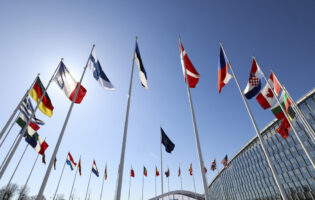Networks in Climate Policies
Policymaking in Germany and the United States
Speaker:
Dr. Daniel Rasch, DAAD/AGI Research Fellow
Moderator:
Dr. Eric Langenbacher, Senior Fellow and Director of the Society, Culture & Politics Program at AGI
With the next UN Climate Change Conference (COP 28) starting soon, important questions arise: what did the countries Germany and the United States actually do after the Paris Agreement (COP 21) and how have they implemented the Paris Agreement on climate change?
Comparing Germany and the United States, which both ratified the Paris Agreement in 2016, this webinar looks at the differences of both countries’ climate policies and how they came to be. Both states struggle to implement climate policies that do not hinder their economy and that are effective in combating climate change.
Since policymaking is not straightforward and decision-makers need expert advice and policy ideas that they do not generate themselves, they resort to working with interest groups or experts. These actors offer political support to policy makers and provide feedback on loopholes and shortcomings. Policymakers benefit from consulting networks in different forms such as expert commissions and expert councils related to specific policy proposals—often through written consultations or hearings. These relationships demonstrate who gives evidence to whom and how certain policies are shaped by this form of inside lobbying. Are there differences in German and U.S. climate policies and, if so, what are they?
Daniel Rasch
Dr. Daniel Rasch is a researcher in public policy and public administration with a focus on policy areas such as energy, environment, and security. He was an interim professor at the University of Public Administration in Speyer for Empirical Research Methods and is currently employed at the Fern Universität Hagen.
His PhD (2016) focused on framing and lobbying success in the multi-level governance context of the European Union. He published widely on the topic of governance and interest mediation.
His current research focuses on interest mediation in the German federal ministries. He investigates networks and power distribution within policy areas and within the federal administration and uses a vast array of methods, ranging from qualitative and quantitative text analysis, text reuse approaches, to network analysis.
Event Summary
Using social network analysis (SNA), we can compare how different actors working in the climate policy space try to gain access to decision-makers in order to offer input and influence the policymaking process. Understanding the role of social networks and lobbying in this instance helps better contextualize the apparent differences between U.S. and German climate policies.
The United States under President Donald Trump pulled out of the Paris Climate Agreement. The United States reversed this by returning to the Agreement in 2021 when President Joe Biden took office. Comparing the United States and Germany’s climate policies is important given their role in the world economy. They have many similarities, particularly the desire to balance economic and climate protection policies. The United States and Germany also share largely similar climate policy goals—for instance, the United States strives to achieve a net-zero emissions economy by 2050, and Germany seeks to do that by 2045. Because of Russia’s war in Ukraine, some of these policy goals have been jeopardized, especially given Germany’s heavy reliance on Russian energy imports.
Because governments often need additional information, data, and expertise, they often turn to outside parties and stakeholders to ensure that the policies adopted are based on accurate data and reflect the interests of the groups affected. Governments need their input not only for expertise and to solve the issue of incomplete information and data, but to also give legitimacy to the policies adopted. These consultations can take different forms and follow different dynamics in the United States versus Germany due to the difference in their respective domestic political systems.
The Study
Dr. Rasch’s research findings are based on the study of 577 consultations involving 1,794 actors in the United States and forty-six consultations involving 426 actors in Germany since 2016. The study was conducted using social network analysis (SNA), a process of investigating social structures through networks and graph theory.
The results of the study show the contrast between the two systems. First, while more than 70 percent of climate policies adopted in the United States are mainly soft measures, Germany’s preferred policymaking tools are regulatory instruments. Second, there is a higher diversity of actors involved in the process in the United States. These actors include individual experts, companies, and interest organizations that have a similar share in terms of the number of consultations, whereas in Germany 79 percent of the actors are business interest groups. Another key difference revealed by the study was the higher number of actors per instance of policymaking in Germany.
Discussion
The Q&A session began with a question on the possible reasons causing a stark difference between the preferred instances of policymaking in the United States (soft measures) vs Germany (regulatory framework). It is noted that hearings in the United States serve as a tool for information-gathering purposes, while in Germany ministries are more “free” to implement the stakeholder input. This is because consultations happen before a draft of the bill is introduced in the legislature. Some of the other differences discussed include the U.S. Senate’s propensity to invite private companies for consultations more frequently and the difference between inside and outside strategies, such as protests and demonstrations.
During the discussion, the population differences and the differing political systems of Germany and the United States were emphasized as explanations for the contrasting models revealed by the study.
This event is supported by the DAAD with funds from the Federal Foreign Office.






